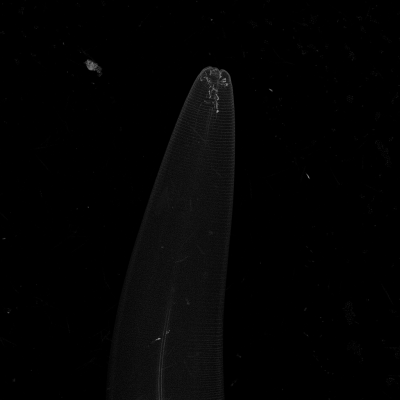Research Recap: Linguistics article, biology research and a student panel at an interdisciplinary humanities conference
Western’s faculty and students are engaged in exciting research and scholarship across a variety of fields. Each week, Western Today will share short summaries of the latest developments in scholarly work at the University. Interested in reading in-depth stories about science and research at Western? Go to Gaia, the university's online journal of research, discovery and scholarship, and subscribe (it's free) to that site by clicking the "Follow" button. Want more research news? Follow @WWUResearch on Twitter.
Virginia Dawson
A new article from Assistant Professor of Linguistics Virginia Dawson was published in the journal Linguistic Inquiry in January.
In the article, titled "Outscoping the Directive Force of Imperatives," Dawson explores the interpretation of disjunction ("or" statements) in imperative sentences in Tiwa, a Tibeto-Burman language of Assam, India. She shows that the meanings these sentences can have differ quite radically from the meanings available to similar sentences in English, and further argues that the interpretation of the Tiwa sentences provides evidence in favor of a theory of imperative meaning which is located directly in the grammar, rather than being inferred from context. Exploring the semantics of Tiwa, she shows, allows us to mediate between two competing theories of imperative meaning in a way that only exploring English and similar languages cannot.
This article is part of Dawson's larger research and teaching interests, which focus on semantic theory by examining data in languages that have historically received less attention from theorists. The majority of this work draws on data from Tiwa, as part of a larger language documentation project she has worked on with Tiwa speakers in India since 2012.
Heino Hulsey-Vincent
Heino Hulsey-Vincent (he/him/his) is a first-year graduate student of biology and recipient of the WWU Graduate Research Award for his thesis titled, “Cell Specific ERAD Rescue in Caenorhabditis Elegans.” Under the direction of his graduate research advisor, Associate Professor of Biology Lina Dahlberg, Heino studies protein quality control in neurons. More specifically, he focuses on the proteins that are responsible for marking misshapen proteins to be destroyed.
Proteins misfold all the time. But misshapen proteins, if not corrected, must be destroyed so they don’t become harmful to our cells. If the degradation process suffers, protein build-up can lead to diseases such as cystic fibrosis, ALS, Parkinson’s disease, and Alzheimer’s disease. Because mammalian nervous systems are difficult to work with, Heino uses roundworms as a model organism for his research.
Heino started at Western as an undergrad and continued on to Western’s master's program in biology.
“I’d encourage undergrads to join a lab immediately if you have any interest in research,” he says of the advice he’d pass on to other students.
Heino has presented his now published research at a number of conferences, including the Seattle Cell Science Symposium and the American Society for Cell Biology in Washington, D.C., and notes that most people in his group who went to D.C. got their travel and registration fees paid for by Western.
“The travel and conference funding is a great example of what doors open when you join a lab,” he says. “Our research mentors are very supportive, and in the lab, there’s no competitiveness. It’s collaborative—we all help each other out.”
After graduation, Heino plans to join a lab where he can either model disease or explore neurons more and is interested in understanding more about learning and memory on a cellular level. Heino recently joined Giving What We Can, an effective altruism organization, and pledged 10% of his pre-tax income to charity from now until his retirement so that wherever his lab research takes him, he’ll still have firm footing in reducing climate change and improving human well-being.
Interdisciplinary Humanities Conference
Western students Itzel Olivera, Kendra Sutton, Sylvia Cohen, and Alessandro Tomasi participated in the 2nd Annual Undergraduate Students Conference, Celebrating the Interdisciplinary Humanities, organized by Rockford University in Illinois, on April 29-30.
The Western students' panel was titled “Nosotros los de entonces: Continuidades culturales, sociales y lingüísticas en América Latina” (We the Then: Cultural, Social and Linguistic Continuities in Latin America). The panel, which the students presented virtually, included topics on feminism, language and culture preservation policies, popular indigenous religiosity, and aimed to highlight the relevance of multidisciplinary approaches to debates in and out of the classroom. At the same time, the four papers that made up the panel had in common the relationship between the past and the present, to highlight the relevance of knowing the past as a starting point for understanding, studying and analyzing the present. Another very relevant element is that three of the papers were presented in English and three in Spanish, which is the second language that these students have learned and study; in this way the relevance of bilingualism was also demonstrated when the speakers and attendees were able to navigate the topics presented in both languages.
The panel was organized and moderated by Hugo García González, Associate Professor of Spanish and Latin American Literatures and Cultures in Western’s Department of Modern and Classical Languages.
Here are the papers presented as part of the students’ panel:
Kendra Sutton: “Concordancia feminista entre Sor Juana Inés de la Cruz y Rosario Castellanos.” (Feminist Concordance between Sor Juana Inés de la Cruz and Rosario Castellanos).
Alessandro Tomasi: “El retorno de los dioses: la intersección entre la religiosidad, historia y globalización en “Chac Mool.” (The return of the gods: the intersection of religiosity, history, and globalization in "Chac Mool")
Sylvia Cohen: “Rarámuri Language Conservation and the Rural School System in Chihuahua Mexico: When Bilingual Education Isn't Enough.”
Itzel Olivera: “La suciedad dentro de la Sociedad: la abyección frente a la pandemia y la sexualidad.” (Dirt within society: Abjection in the face of pandemic and sexuality)
